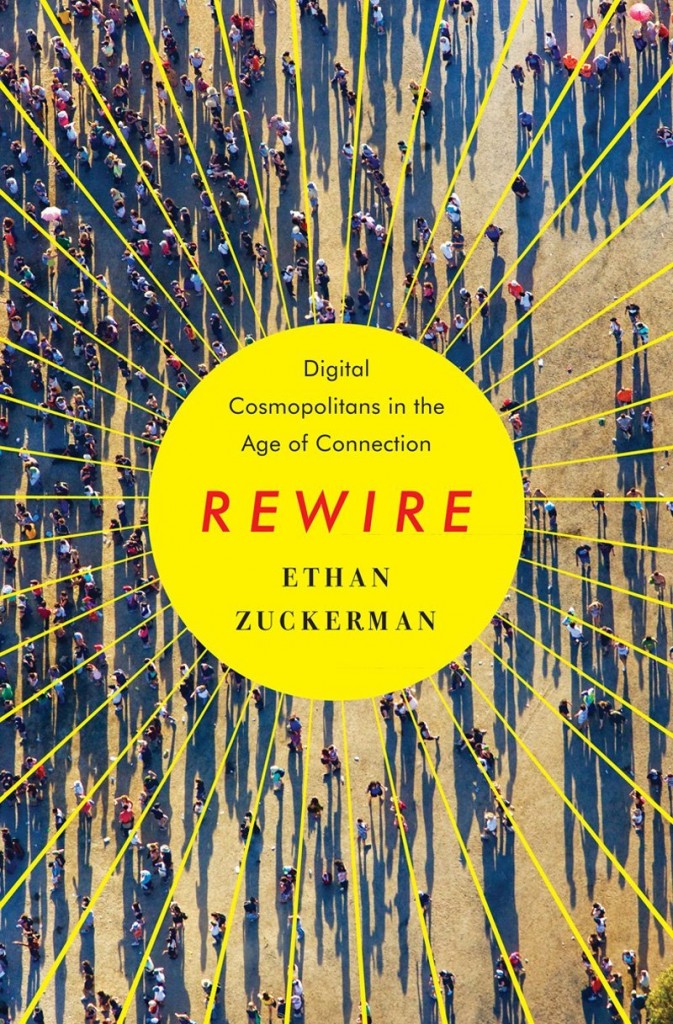Rewire

We live in an age of connection, one that is accelerated by the Internet.
This increasingly ubiquitous, immensely powerful technology often leads us to assume that as the number of people online grows, it inevitably leads to a smaller, more cosmopolitan world. We’ll understand more, we think. We’ll know more. We’ll engage more and share more with people from other cultures. In reality, it is easier to ship bottles of water from Fiji to Atlanta than it is to get news from Tokyo to New York.
In Rewire, media scholar and activist Ethan Zuckerman explains why the technological ability to communicate with someone does not inevitably lead to increased human connection. At the most basic level, our human tendency to “flock together†means that most of our interactions, online or off, are with a small set of people with whom we have much in common. In examining this fundamental tendency, Zuckerman draws on his own work as well as the latest research in psychology and sociology to consider technology’s role in disconnecting ourselves from the rest of the world.
For those who seek a wider picture—a picture now critical for survival in an age of global economic crises and pandemics—Zuckerman highlights the challenges, and the headway already made, in truly connecting people across cultures. From voracious xenophiles eager to explore other countries to bridge figures who are able to connect one culture to another, people are at the center of his vision for a true kind of cosmopolitanism. And it is people who will shape a new approach to existing technologies, and perhaps invent some new ones, that embrace translation, cross-cultural inspiration, and the search for new, serendipitous experiences.
Originally published in 2013 by W.W. Norton, it was re-released in paperback as Digital Cosmopolitans. This book took shape while I was helping to build Global Voices with my co-founder Rebecca MacKinnon. It started from my realization that many of the interesting and exciting ideas I was encountering came from the community of friends I’d met through weblogs, and left me wondering how the internet could be made a more cosmopolitan space.
I still care deeply about the questions raised in Rewire, and hope that some of the ideas near the close about engineering serendipity might come up again in my work at UMass on building new kinds of social networks.
Reviews
“We live in an age of connection, one that is accelerated by the Internet. This increasingly ubiquitous, immensely powerful technology often leads us to assume that as the number of people online grows, it inevitably leads to a smaller, more cosmopolitan world. We’ll understand more, we think. We’ll know more. We’ll engage more and share more with people from other cultures. In reality, it is easier to ship bottles of water from Fiji to Atlanta than it is to get news from Tokyo to New York.
In Rewire, media scholar and activist Ethan Zuckerman explains why the technological ability to communicate with someone does not inevitably lead to increased human connection. At the most basic level, our human tendency to “flock together†means that most of our interactions, online or off, are with a small set of people with whom we have much in common. In examining this fundamental tendency, Zuckerman draws on his own work as well as the latest research in psychology and sociology to consider technology’s role in disconnecting ourselves from the rest of the world.
For those who seek a wider picture—a picture now critical for survival in an age of global economic crises and pandemics—Zuckerman highlights the challenges, and the headway already made, in truly connecting people across cultures. From voracious xenophiles eager to explore other countries to bridge figures who are able to connect one culture to another, people are at the center of his vision for a true kind of cosmopolitanism. And it is people who will shape a new approach to existing technologies, and perhaps invent some new ones, that embrace translation, cross-cultural inspiration, and the search for new, serendipitous experiences.”
In a starred review, Publisher’s Weekly calls it a “fascinating and powerful reflection on what it means to be a citizen of the world in the Internet ageâ€, and notes, “Zuckerman’s imaginative and inventive reflections offer a resourceful guide to living a connected life with intention and insight.â€
I’m particularly fond of this review by Andrew Golis, which makes clear how challenging cosmopolitanism is, pointing out that the five people who’ve blurbed my book are emphatically in my tribe.
- John Naughton in the Guardian/Observer
- Oliver Burkeman in his blog on The Guardian
- Franklyn Cater in NPR Books
- Richard Morrison in the Times of London
- Jacob Silverman in the Los Angeles Review of Books
- Astra Taylor in Bookforum
- Kirkus
- David Sasaki
- David Rieff in Foreign Policy, and my response
- Reviews on GoodReads
Discussion
Talks
I spoke about the book at Harvard, sponsored by the Berkman Center.
Interviews
I’ve had several radio conversations about the book – I particularly enjoyed this one with Joe Donahue on WAMC, my local NPR station.